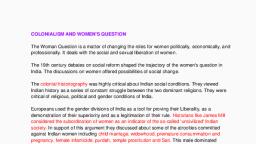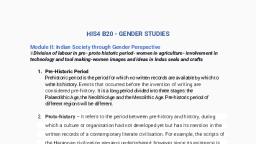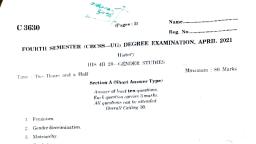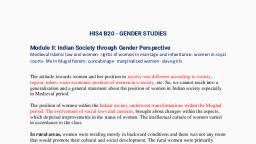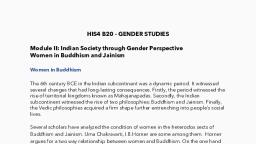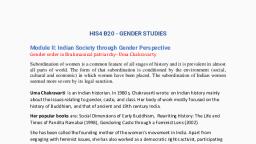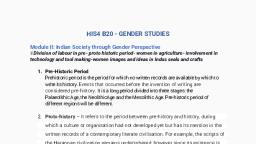Page 1 :
COLONIALISM AND WOMEN'S QUESTION, The Woman Question is a matter of changing the roles for women politically, economically, and, professionally. It deals with the social and sexual liberation of women., The 19th century debates on social reform shaped the trajectory of the women's question in, India. The discussions on women offered possibilities of social change., The colonial historiography was highly critical about Indian social conditions. They viewed, Indian history as a series of constant struggle between the two dominant religions. They were, critical of religious, political and gender conditions of India., Europeans used the gender divisions of India as a tool for proving their Liberality, as a, demonstration of their superiority and as a legitimation of their rule. Historians like James Mill, considered the subordination of women as an indicator of the so-called 'uncivilized' Indian, society. In support of this argument they discussed about some of the atrocities committed, against Indian women including child marriage, widowhood, premature consummation and, pregnancy, female infanticide, purdah, temple prostitution and Sati. This male dominated, culture was related to the weakening of the Indian society. A similar argument can be seen in, Katherine Mayo ' s Mother India published in 1927. She has attributed India's subjugation to, the sexual organization and the abuse of Indian women by Indian men. But Katherine Mayo, failed to analyze the impacts of British Colonialism on Indian women., British policies in India., On analyzing the British policies relating to women in India, we can see that there are two, opposing trends. In the 18th century British administration tried not to intervene in Indian law, and customs, however they took several legal initiatives to end certain abuses on women., Between 1795 and 1937,they liberalized the laws on six major issues of relevance to women., 1. Female infanticide was prohibited in Acts of 1795 , 1804 and 1870., 2. Sati was prohibited in 1829., 3. Widow remarriage was allowed in 1856., 4. The age of consent of sexual intercourse was fixed at 10 in 1860 and raised to 12 in 1891., 5. Child marriage was prohibited in 1929., 6. Several laws were passed to ensure inheritance rights for women., These legislations were made by British government as a positive response to the activities of, Indian social reformers, like Ram Mohan Roy and Iswara Chandra Vidyasagar. The colonial, administration made laws when they were called upon by the Indian reformers., In contrast to the these reforms to improve the whole lot of women, British actions in some, other areas present another picture in their attitude towards Indian women. Eg., 1. The restitution of marital rights, The colonial government introduced a provision for the restitution of conjugal rights, a concept, based on Christian law. This law allowed a person to approach the court if the spouse refused, to fulfill sexual obligations of marriage. Before the introduction of this law women who refused, to live in husband's house were to sent to their parent's house and this was an informal way by, which women could escape from unhappy marriage.
Page 2 :
2. Prostitution, The British Indian army maintained several prostitutes for their British soldiers. There was a, system of Prostitution under the control of the government which included registration, medical, examination and accommodation., There was a constant influx of women into prostitution and most of them were high caste, widows, child widows either abandoned or abused by family members. In 1887 Alfred Dyer, reported the violence and injuries done to Indian prostitutes by the British troops. But, authorities were concerned only about the needs of the soldiers., 3. Female Suffrage, Vote for women was first raised as an issue in 1917, when a women’s delegation met, Montague, The Secretary of State for India. But he did not even mention this in his report., Even Though many of the political parties and leaders were in favour of this British were not, ready to grant voting rights to women. They considered it to be too premature to grant women, voting rights., British imperialism in India was built upon the gender differences that had existed in the, society. The legislation initiated by the colonial government was not out the genuine, consideration for the emancipation of Indian women.









